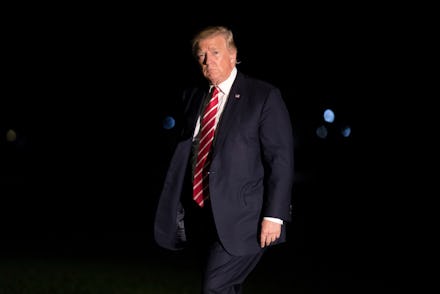New report finds Trump “likely” obstructed justice when he fired James Comey

President Donald Trump “likely” committed obstruction of justice when he fired FBI Director James Comey, according to a new paper co-authored by a former top White House ethics counsel.
In a report published by the Brookings Institute, Norm Eisen, former President Barack Obama’s top ethics chief, and two legal experts accused Trump of violating several obstruction of justice statutes and suggested that he could be removed from office.
“Our review of the facts and the law leads us to the view that the president likely obstructed justice,” the authors wrote. “Should that conclusion be borne out, we believe he will be held to account under one or another of the vehicles we have outlined, for no one is above the law in our system.”
In the paper, Eisen and his co-authors — attorney Barry H. Berker and Citizens for Responsibility and Ethics in Washington executive director Noah Bookbinder also say that what Trump did and said both before and after firing Comey also could be used in an obstruction case against Trump.
While accusations of obstruction of justice violations against Trump are nothing new, the paper Monday perhaps is the most comprehensive so far in laying out a potential case against Trump — and, according to the authors, could serve as a template for special counsel Robert Mueller and others investigating the president.
“Accountability will have significant consequences for the functioning of our democracy,” the authors wrote. “We offer this paper as a framework to evaluate the facts and the investigation as they develop, and to help prepare for the turbulence that may well lie ahead.”
Eisen’s case for obstruction against Trump
Trump fired Comey in May, writing in a letter that he was “not able to effectively lead the bureau” and pointing to a memo from Deputy Attorney General Rod Rosenstein that argued Comey had “made serious mistakes” in his handling of Hillary Clinton’s email scandal.
But the next day, Trump told Kremlin officials in an Oval Office meeting that firing “nut job” Comey had eased the “great pressure because of Russia” that he was facing, suggesting that the termination was politically motivated.
Comey was leading the FBI investigation into Russia’s interference in the 2016 presidential election in the United States, which included questions about possible collusion on the part of the Trump campaign.
Trump had apparently asked for Comey’s “loyalty” and sought to have the FBI director kill his probe into ousted national security adviser Michael Flynn, according to reports that emerged after Comey was sacked.
According to the paper, there’s a “very real possibility” that Trump’s actions constitute violations of obstruction codes 1503, 1505 and 1512 — statutes that protect against attempting to influence officers of the court, block proceedings of committees or agencies and tamper with witnesses or informants, respectively.
Violation of those statutes can carry up to a 20 year prison sentence, the authors note.
Additionally, if investigators find that anyone in Trump’s orbit acted in an attempt to somehow obstruct justice, it could be grounds for prosecutors to open a conspiracy case against the president, according to Eisen, Berke and Bookbinder.
Altogether, the 108-page paper lays out a detailed, remarkably convincing case that Trump could have already violated the law. As Jennifer Rubin pointed out Tuesday in the Washington Post’s conservative “Right Turn” blog, — the authors don’t even mention the president’s attempts to obfuscate his financial ties to Russia and his public efforts to cast doubt on the validity of the Russia investigations, which were undertaken “to try to protect himself from investigators’ prying eyes or to avoid being ‘outed’ by the Russians.”
According to Eisen, it was “among the hardest pieces of legal writing” he had ever been part of in his more than 25 years of work.
Mueller has been investigating the possibility that Trump obstructed justice since at least June as part of his fast-moving Russia probe, which the president has repeatedly decried as a “hoax” and a “witch hunt.”
Eisen and his co-authors on Monday acknowledged that the “subject of impeachment on obstruction grounds remains premature pending the outcome of the special counsel’s investigation.”
But, as Rubin observed Tuesday, the paper makes clear that “it is hardly a stretch to conclude that evidence will be found to support an obstruction charge.”
“The insistence that Trump is in no legal peril and may be cleared by the special counsel ... increasingly appears to be a matter of self-delusion and bad lawyering on Trump’s behalf,” Rubin wrote. “The obstruction ‘brief’ should scare the daylights out of those Trump supporters, family members and aides who are smart enough to appreciate the voluminous evidence that may be marshaled against the president.”